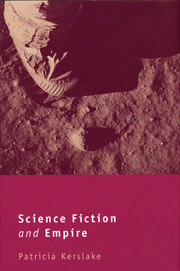Book contents
- Frontmatter
- Contents
- Introduction
- 1 The Self and Representations of the Other in Science Fiction
- 2 Resistance Is Futile: Silencing and Cultural Appropriation
- 3 The Word for World Is Forest: Metaphor and Empire in Science Fiction
- 4 Things Fall Apart: Relativity, Distance and the Periphery
- 5 Moments of Empire: Perceptions of Lasswitz and Wells
- 6 Exoticising the Future: American Greats
- 7 The Shape of Things to Come: Homo futuris and the Imperial Project
- 8 A Postcolonial Imagination: Kim Stanley Robinson's Mars
- 9 Beyond Empire: Meta-empire and Postcoloniality
- Conclusion
- Notes
- Bibliography
- Index
9 - Beyond Empire: Meta-empire and Postcoloniality
- Frontmatter
- Contents
- Introduction
- 1 The Self and Representations of the Other in Science Fiction
- 2 Resistance Is Futile: Silencing and Cultural Appropriation
- 3 The Word for World Is Forest: Metaphor and Empire in Science Fiction
- 4 Things Fall Apart: Relativity, Distance and the Periphery
- 5 Moments of Empire: Perceptions of Lasswitz and Wells
- 6 Exoticising the Future: American Greats
- 7 The Shape of Things to Come: Homo futuris and the Imperial Project
- 8 A Postcolonial Imagination: Kim Stanley Robinson's Mars
- 9 Beyond Empire: Meta-empire and Postcoloniality
- Conclusion
- Notes
- Bibliography
- Index
Summary
What happens after an empire is displaced? When an imperial construct is removed, such as the British Raj or the control of the French Caribbean colonies, what fills the vacuum? In the real world, there are various forms of action, from a careful, gradual absence (the British withdrawal from India) to a devastating collapse, with violence accompanying partition (the fall of the Soviet Union). Historically, the removal of an imperium has more often been a gradual process; a new structure of postcolonial governance has usually been able to fill as much as it can or wants of the vacated postimperial matrix. This new growth has many names. It may reclaim an older nationality or proclaim itself reborn in a different guise. It may become part of a new association or may, as illustrated by events in the demise of the Soviet Union, devolve into small units of varying culture. But in the realm of fiction, and especially of SF, transition between the old regime and the new is often more distinct and abrupt, the requirements of the narrative overriding the realities of slow political exactitude, demanding some more immediate, alternative replacement – an instant fabrication. Political forms can alter radically and without even a partial precedent, especially in the avant-garde of SF.
Traditionally, the genre still embraces a certain strain of realism, as the old centre expires and is replaced by something which incorporates a predictable political decay, such as the gradual reformation of the ‘old’ USA into the economic despond of Philip K. Dick's Do Androids Dream of Electric Sheep? (1968) or Isaac Asimov's Foundation and Empire (1952).
- Type
- Chapter
- Information
- Science Fiction and Empire , pp. 168 - 187Publisher: Liverpool University PressPrint publication year: 2010

